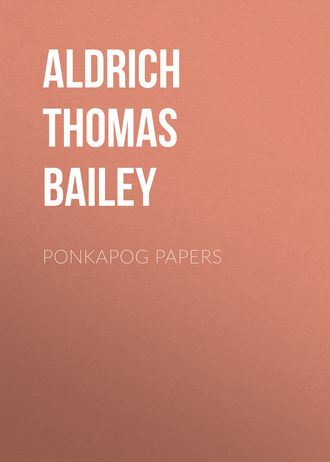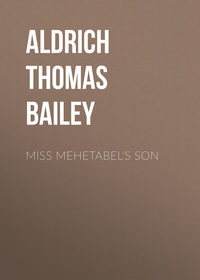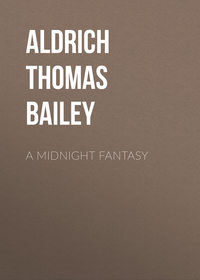 полная версия
полная версияPonkapog Papers
ALL the best sands of my life are somehow getting into the wrong end of the hour-glass. If I could only reverse it! Were it in my power to do so, would I?
SHAKESPEARE is forever coming into our affairs—putting in his oar, so to speak—with some pat word or sentence. The conversation, the other evening, had turned on the subject of watches, when one of the gentlemen present, the manager of a large watch-making establishment, told us a rather interesting fact. The component parts of a watch are produced by different workmen, who have no concern with the complex piece of mechanism as a whole, and possibly, as a rule, understand it imperfectly. Each worker needs to be expert in only his own special branch. When the watch has reached a certain advanced state, the work requires a touch as delicate and firm as that of an oculist performing an operation. Here the most skilled and trustworthy artisans are employed; they receive high wages, and have the benefit of a singular indulgence. In case the workman, through too continuous application, finds himself lacking the steadiness of nerve demanded by his task, he is allowed without forfeiture of pay to remain idle temporarily, in order that his hand may recover the requisite precision of touch. As I listened, Hamlet’s courtly criticism of the grave-digger’s want of sensibility came drifting into my memory. “The hand of little employment hath the daintier sense,” says Shakespeare, who has left nothing unsaid.
IT was a festival in honor of Dai Butsu or some one of the auxiliary deities that preside over the destinies of Japland. For three days and nights the streets of Tokio—where the squat little brown houses look for all the world as if they were mimicking the favorite sitting posture of the Japanese—were crowded with smiling holiday makers, and made gay with devices of tinted tissue paper, dolphins, devils, dragons, and mythical winged creatures which at night amiably turned themselves into lanterns. Garlands of these, arranged close together, were stretched across the streets from ridgepoles to ridgepole, and your jinrikisha whisked you through interminable arbors of soft illumination. The spectacle gave one an idea of fairyland, but then all Japan does that.
A land not like ours, that land of strange flowers, Of daemons and spooks with mysterious powers— Of gods who breathe ice, who cause peach-blooms and rice And manage the moonshine and turn on the showers. Each day has its fair or its festival there, And life seems immune to all trouble and care— Perhaps only seems, in that island of dreams, Sea-girdled and basking in magical air. They’ve streets of bazaars filled with lacquers and jars, And silk stuffs, and sword-blades that tell of old wars; They’ve Fuji’s white cone looming up, bleak and lone, As if it were trying to reach to the stars. They’ve temples and gongs, and grim Buddhas in throngs, And pearl-powdered geisha with dances and songs: Each girl at her back has an imp, brown or black, And dresses her hair in remarkable prongs. On roadside and street toddling images meet, And smirk and kotow in a way that is sweet; Their obis are tied with particular pride, Their silken kimonos hang scant to the feet. With purrs like a cat they all giggle and chat, Now spreading their fans, and now holding them flat; A fan by its play whispers, “Go now!” or “Stay!” “I hate you!” “I love you!”—a fan can say that! Beneath a dwarf tree, here and there, two or three Squat coolies are sipping small cups of green tea; They sputter, and leer, and cry out, and appear Like bad little chessmen gone off on a spree. At night—ah, at night the long streets are a sight, With garlands of soft-colored lanterns alight— Blue, yellow, and red twinkling high overhead, Like thousands of butterflies taking their flight. Somewhere in the gloom that no lanterns illume Stand groups of slim lilies and jonquils in bloom; On tiptoe, unseen ‘mid a tangle of green, They offer the midnight their cups of perfume. At times, sweet and clear from some tea-garden near, A ripple of laughter steals out to your ear; Anon the wind brings from a samisen’s strings The pathos that’s born of a smile and a tear.THE difference between an English audience and a French audience at the theatre is marked. The Frenchman brings down a witticism on the wing. The Briton pauses for it to alight and give him reasonable time for deliberate aim. In English playhouses an appreciable number of seconds usually precede the smile or the ripple of laughter that follows a facetious turn of the least fineness. I disclaim all responsibility for this statement of my personal observation, since it has recently been indorsed by one of London’s most eminent actors.
AT the next table, taking his opal drops of absinthe, was a French gentleman with the blase aspect of an empty champagne-bottle, which always has the air of saying: “I have lived!”
WE often read of wonderful manifestations of memory, but they are always instances of the faculty working in some special direction. It is memory playing, like Paganini, on one string. No doubt the persons performing the phenomenal feats ascribed to them have forgotten more than they remember. To be able to repeat a hundred lines of verse after a single reading is no proof of a retentive mind, excepting so far as the hundred lines go. A man might easily fail under such a test, and yet have a good memory; by which I mean a catholic one, and that I imagine to be nearly the rarest of gifts. I have never met more than four or five persons possessing it. The small boy who defined memory as “the thing you forget with” described the faculty as it exists and works in the majority of men and women.
THE survival in publishers of the imitative instinct is a strong argument in support of Mr. Darwin’s theory of the descent of man. One publisher no sooner brings out a new style of book-cover than half a dozen other publishers fall to duplicating it.
THE cavalry sabre hung over the chimney-place with a knot of violets tied to the dinted guard, there being no known grave to decorate. For many a year, on each Decoration Day, a sorrowful woman had come and fastened these flowers there. The first time she brought her offering she was a slender girl, as fresh as her own violets. It is a slender figure still, but there are threads of silver in the black hair.
FORTUNATE was Marcus Aurelius Antoninus, who in early youth was taught “to abstain from rhetoric, and poetry, and fine writing”—especially the fine writing. Simplicity is art’s last word.
The man is clearly an adventurer. In the seventeenth century he would have worn huge flintlock pistols stuck into a wide leather belt, and been something in the seafaring line. The fellow is always smartly dressed, but where he lives and how he lives are as unknown as “what song the Sirens sang, or what name Achilles assumed when he hid himself among women.” He is a man who apparently has no appointment with his breakfast and whose dinner is a chance acquaintance. His probable banker is the next person. A great city like this is the only geography for such a character. He would be impossible in a small country town, where everybody knows everybody and what everybody has for lunch.
I HAVE been seeking, thus far in vain, for the proprietor of the saying that “Economy is second or third cousin to Avarice.” I went rather confidently to Rochefoucauld, but it is not among that gentleman’s light luggage of cynical maxims.
THERE is a popular vague impression that butchers are not allowed to serve as jurors on murder trials. This is not really the case, but it logically might be. To a man daily familiar with the lurid incidents of the abattoir, the summary extinction of a fellow creature (whether the victim or the criminal) can scarcely seem a circumstance of so serious moment as to another man engaged in less strenuous pursuits. WE do not, and cannot, read many of the novels that most delighted our ancestors. Some of our popular fiction is doubtless as poor, but poor with a difference. There is always a heavy demand for fresh mediocrity. In every generation the least cultivated taste has the largest appetite. There is ragtime literature as well as ragtime music for the many.
G– is a man who had rather fail in a great purpose than not accomplish it in precisely his own way. He has the courage of his conviction and the intolerance of his courage. He is opposed to the death penalty for murder, but he would willingly have any one electrocuted who disagreed with him on the subject.
I HAVE thought of an essay to be called “On the Art of Short-Story Writing,” but have given it up as smacking too much of the shop. It would be too intime, since I should have to deal chiefly with my own ways, and so give myself the false air of seeming to consider them of importance. It would interest nobody to know that I always write the last paragraph first, and then work directly up to that, avoiding all digressions and side issues. Then who on earth would care to be told about the trouble my characters cause me by talking too much? They will talk, and I have to let them; but when the story is finished, I go over the dialogue and strike out four fifths of the long speeches. I fancy that makes my characters pretty mad.
THIS is the golden age of the inventor. He is no longer looked upon as a madman or a wizard, incontinently to be made away with. Two or three centuries ago Marconi would not have escaped a ropeless end with his wireless telegraphy. Even so late as 1800, the friends of one Robert Fulton seriously entertained the luminous idea of hustling the poor man into an asylum for the unsound before he had a chance to fire up the boiler of his tiny steamboat on the Hudson river. In olden times the pillory and the whipping-post were among the gentler forms of encouragement awaiting the inventor. If a man devised an especially practical apple-peeler he was in imminent danger of being peeled with it by an incensed populace. To-day we hail with enthusiasm a scientific or a mechanical discovery, and stand ready to make a stock company of it.
A MAN is known by the company his mind keeps. To live continually with noble books, with “high-erected thoughts seated in the heart of courtesy,” teaches the soul good manners.
THE unconventional has ever a morbid attraction for a certain class of mind. There is always a small coterie of highly intellectual men and women eager to give welcome to whatever is eccentric, obscure, or chaotic. Worshipers at the shrine of the Unpopular, they tingle with a sense of tolerant superiority when they say: “Of course this is not the kind of thing you would like.” Sometimes these impressionable souls almost seem to make a sort of reputation for their fetish.
I HEAR that B– directed to have himself buried on the edge of the pond where his duckstand was located, in order that flocks of migrating birds might fly over his grave every autumn. He did not have to die, to become a dead shot. A comrade once said of him: “Yes, B– is a great sportsman. He has peppered everything from grouse in North Dakota to his best friend in the Maine woods.”
WHEN the novelist introduces a bore into his novel he must not let him bore the reader. The fellow must be made amusing, which he would not be in real life. In nine cases out of ten an exact reproduction of real life would prove tedious. Facts are not necessarily valuable, and frequently they add nothing to fiction. The art of the realistic novelist sometimes seems akin to that of the Chinese tailor who perpetuated the old patch on the new trousers. True art selects and paraphrases, but seldom gives a verbatim translation.
THE last meeting I had with Lowell was in the north room of his house at Elmwood, the sleeping-room I had occupied during a two years’ tenancy of the place in his absence abroad. He was lying half propped up in bed, convalescing from one of the severe attacks that were ultimately to prove fatal. Near the bed was a chair on which stood a marine picture in aquarelle—a stretch of calm sea, a bit of rocky shore in the foreground, if I remember, and a vessel at anchor. The afternoon sunlight, falling through the window, cast a bloom over the picture, which was turned toward Lowell. From time to time, as he spoke, his eyes rested thoughtfully on the water-color. A friend, he said, had just sent it to him. It seemed to me then, and the fancy has often haunted me since, that that ship, in the golden haze, with topsails loosened, was waiting to bear his spirit away.
CIVILIZATION is the lamb’s skin in which barbarism masquerades. If somebody has already said that, I forgive him the mortification he causes me. At the beginning of the twentieth century barbarism can throw off its gentle disguise, and burn a man at the stake as complacently as in the Middle Ages.
WHAT is slang in one age sometimes goes into the vocabulary of the purist in the next. On the other hand, expressions that once were not considered inelegant are looked at askance in the period following. The word “brass” was formerly an accepted synonym for money; but at present, when it takes on that significance, it is not admitted into genteel circles of language. It may be said to have seen better days, like another word I have in mind—a word that has become slang, employed in the sense which once did not exclude it from very good society. A friend lately informed me that he had “fired” his housekeeper—that is, dismissed her. He little dreamed that he was speaking excellent Elizabethan.
THE “Journal des Goncourt” is crowded with beautiful and hideous things, like a Japanese Museum.
“AND she shuddered as she sat, still silent, on her seat, and he saw that she shuddered.” This is from Anthony Trollope’s novel, “Can You Forgive Her?” Can you forgive him? is the next question.
A LITTLE thing may be perfect, but perfection is not a little thing. Possessing this quality, a trifle “no bigger than an agate-stone on the forefinger of an alderman” shall outlast the Pyramids. The world will have forgotten all the great masterpieces of literature when it forgets Lovelace’s three verses to Lucasta on his going to the wars. More durable than marble or bronze are the words, “I could not love thee, deare, so much, loved I not honor more.”
I CALLED on the dear old doctor this afternoon to say good-by. I shall probably not find him here when I come back from the long voyage which I have in front of me. He is very fragile, and looks as though a puff of wind would blow him away. He said himself, with his old-time cheerfulness, that he was attached to this earth by only a little piece of twine. He has perceptibly failed since I saw him a month ago; but he was full of the wise and radiant talk to which all the world has listened, and will miss. I found him absorbed in a newly made card-catalogue of his library. “It was absurd of me to have it done,” he remarked. “What I really require is a little bookcase holding only two volumes; then I could go from one to the other in alternation and always find each book as fresh as if I never had read it.” This arraignment of his memory was in pure jest, for the doctor’s mind was to the end like an unclouded crystal. It was interesting to note how he studied himself, taking his own pulse, as it were, and diagnosing his own case in a sort of scientific, impersonal way, as if it were somebody else’s case and he were the consulting specialist. I intended to spend a quarter of an hour with him, and he kept me three hours. I went there rather depressed, but I returned home leavened with his good spirits, which, I think, will never desert him, here or hereafter. To keep the heart unwrinkled, to be hopeful, kindly, cheerful, reverent—that is to triumph over old age.
THE thing one reads and likes, and then forgets, is of no account. The thing that stays, and haunts one, and refuses to be forgotten, that is the sincere thing. I am describing the impression left upon me by Mr. Howells’s blank-verse sketch called “Father and Mother: A Mystery”—a strangely touching and imaginative piece of work, not unlike in effect to some of Maeterlinck’s psychical dramas. As I read on, I seemed to be standing in a shadow cast by some half-remembered experience of my own in a previous state of existence. When I went to bed that night I had to lie awake and think it over as an event that had actually befallen me. I should call the effect weird, if the word had not lately been worked to death. The gloom of Poe and the spirituality of Hawthorne touch cold finger-tips in those three or four pages.
FOR a character-study—a man made up entirely of limitations. His conservatism and negative qualities to be represented as causing him to attain success where men of conviction and real ability fail of it.
A DARK, saturnine man sat opposite me at table on board the steamer. During the entire run from Sandy Hook to Fastnet Light he addressed no one at meal-times excepting his table steward. Seated next to him, on the right, was a vivacious gentleman, who, like Gratiano in the play, spoke “an infinite deal of nothing.” He made persistent and pathetic attempts to lure his silent neighbor (we had christened him “William the Silent”) into conversation, but a monosyllable was always the poor result—until one day. It was the last day of the voyage. We had stopped at the entrance to Queenstown harbor to deliver the mails, and some fish had been brought aboard. The vivacious gentleman was in a high state of excitement that morning at table. “Fresh fish!” he exclaimed; “actually fresh! They seem quite different from ours. Irish fish, of course. Can you tell me, sir,” he inquired, turning to his gloomy shipmate, “what kind of fish these are?” “Cork soles,” said the saturnine man, in a deep voice, and then went on with his breakfast.
LOWELL used to find food for great mirth in General George P. Morris’s line,
“Her heart and morning broke together.”
Lowell’s well-beloved Dr. Donne, however, had an attack of the same platitude, and possibly inoculated poor Morris. Even literature seems to have its mischief-making bacilli. The late “incomparable and ingenious Dean of St. Paul’s” says,
“The day breaks not, it is my heart.”
I think Dr. Donne’s case rather worse than Morris’s. Chaucer had the malady in a milder form when he wrote:
“Up roos the sonne, and up roos Emelye.”
The charming naivete of it!
SITTING in Ellen Terry’s dressing-room at the Lyceum Theatre one evening during that lady’s temporary absence on the stage, Sarah Bernhardt picked up a crayon and wrote this pretty word on the mirror—Dearling, mistaking it for the word darling. The French actress lighted by chance upon a Spenserianism now become obsolete without good reason. It is a more charming adjective than the one that has replaced it.
A DEAD author appears to be bereft of all earthly rights. He is scarcely buried before old magazines and newspapers are ransacked in search of matters which, for reasons sufficient to him, he had carefully excluded from the definitive edition of his collected writings.
He gave the people of his best; His worst he kept, his best he gave.One can imagine a poet tempted to address some such appeal as this to any possible future publisher of his poems:
Take what thou wilt, a lyric or a line, Take all, take nothing—and God send thee cheer! But my anathema on thee and thine If thou add’st aught to what is printed here.THE claim of this country to call itself “The Land of the Free” must be held in abeyance until every man in it, whether he belongs or does not belong to a labor organization, shall have the right to work for his daily bread.
THERE is a strain of primitive poetry running through the entire Irish race, a fleeting lyrical emotion which expresses itself in a flash, usually in connection with love of country and kindred across the sea. I had a touching illustration of it the other morning. The despot who reigns over our kitchen was gathering a mess of dandelions on the rear lawn. It was one of those blue and gold days which seem especially to belong New England. “It’s in County Westmeath I ‘d be this day,” she said, looking up at me. “I’d go cool my hands in the grass on my ould mother’s grave in the bit of churchyard foreninst the priest’s house at Mullingar.” I have seen poorer poetry than that in the magazines.
SPEAKING of the late Major Pond, the well-known director of a lecture bureau, an old client of his remarked: “He was a most capable manager, but it always made me a little sore to have him deduct twenty-five per cent. commission.” “Pond’s Extract,” murmured one of the gentlemen present.
EACH of our great towns has its “Little Italy,” with shops where nothing is spoken but Italian and streets in which the alien pedestrian had better not linger after nightfall. The chief industry of these exotic communities seems to be spaghetti and stilettos. What with our Little Italys and Chinatowns, and the like, an American need not cross the ocean in order to visit foreign lands and enjoy the benefits of older civilizations.
POETS are made as well as born, the proverb notwithstanding. They are made possible by the general love of poetry and the consequent imperious demand for it. When this is nonexistent, poets become mute, the atmosphere stifles them. There would have been no Shakespeare had there been no Elizabethan audience. That was an age when, as Emerson finely puts it,
Men became Poets, for the air was fame.THE stolid gentleman in livery who has his carriage-stand at the corner opposite my house is constantly touching on the extremes of human experience, with probably not the remotest perception of the fact. Now he takes a pair of lovers out for an airing, and now he drives the absconding bank-teller to the railway-station. Excepting as question of distance, the man has positively no choice between a theatre and a graveyard. I met him this morning dashing up to the portals of Trinity Church with a bridal party, and this afternoon, as I was crossing Cambridge Bridge, I saw him creeping along next to the hearse, on his way to Mount Auburn. The wedding afforded him no pleasure, and the funeral gave him no grief; yet he was a factor in both. It is his odd destiny to be wholly detached from the vital part of his own acts. If the carriage itself could speak! The autobiography of a public hack written without reservation would be dramatic reading.
IN this blotted memorandum-book are a score or two of suggestions for essays, sketches, and poems, which I have not written, and never shall write. The instant I jot down an idea the desire to utilize it leaves me, and I turn away to do something unpremeditated. The shabby volume has become a sort of Potter’s Field where I bury my literary intentions, good and bad, without any belief in their final resurrection.
A STAGE DIRECTION: exit time; enter Eternity—with a soliloquy.
ASIDES
TOM FOLIO
IN my early Boston days a gentle soul was often to be met with about town, furtively haunting old book-shops and dusty editorial rooms, a man of ingratiating simplicity of manner, who always spoke in a low, hesitating voice, with a note of refinement in it. He was a devout worshiper of Elia, and wrote pleasant discursive essays smacking somewhat of his master’s flavor—suggesting rather than imitating it—which he signed “Tom Folio.” I forget how he glided into my acquaintanceship; doubtless in some way too shy and elusive for remembrance. I never knew him intimately, perhaps no one did, but the intercourse between us was most cordial, and our chance meetings and bookish chats extended over a space of a dozen years.
Tom Folio—I cling to the winning pseudonym—was sparely built and under medium height, or maybe a slight droop of the shoulders made it seem so, with a fragile look about him and an aspect of youth that was not his. Encountering him casually on a street corner, you would, at the first glance, have taken him for a youngish man, but the second glance left you doubtful. It was a figure that struck a note of singularity and would have attracted your attention even in a crowd.
During the first four or five years of our acquaintance, meeting him only out of doors or in shops, I had never happened to see him with his hat off. One day he recklessly removed it, and in the twinkling of an eye he became an elderly bald-headed man. The Tom Folio I once knew had virtually vanished. An instant earlier he was a familiar shape; an instant later, an almost unrecognizable individual. A narrow fringe of light-colored hair, extending from ear to ear under the rear brim of his hat, had perpetrated an unintentional deception by leading one to suppose a head profusely covered with curly locks. “Tom Folio,” I said, “put on your hat and come back!” But after that day he never seemed young to me.









